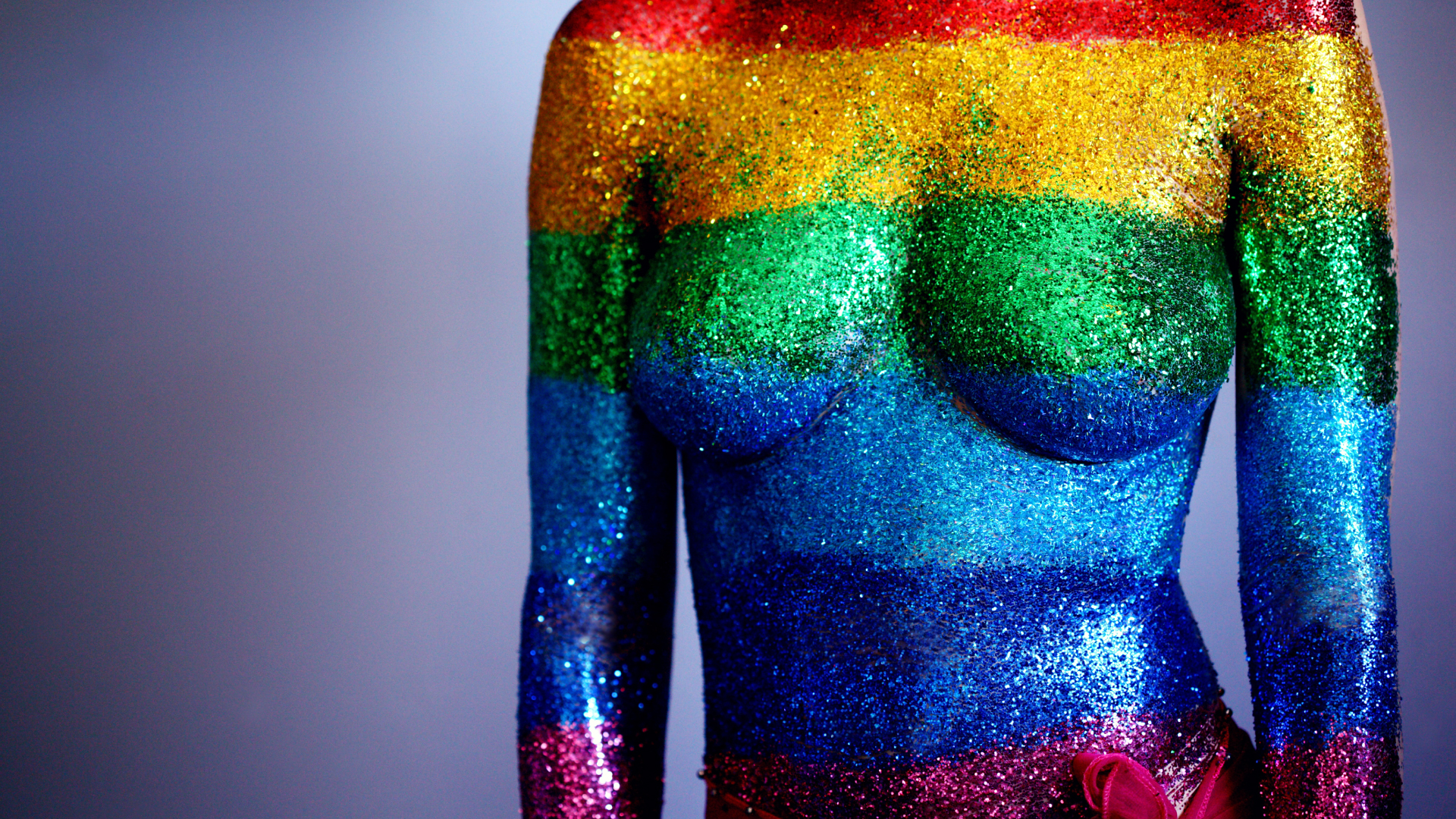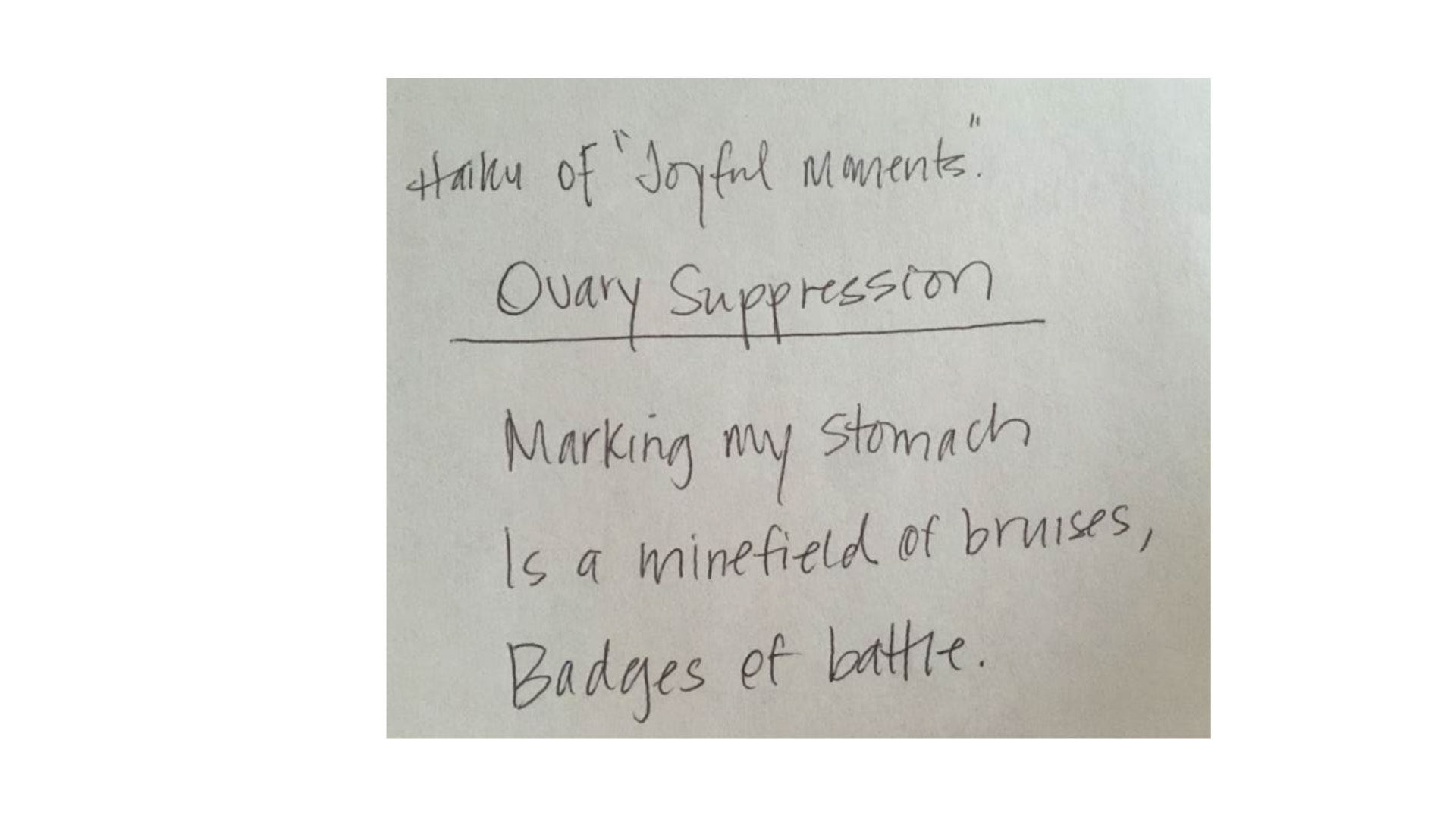Looking to hear other’s experience with dating through cancer? Check out a few of our past posts and weigh in yourself!
Continue readingDating and Cancer History: To Disclose or Not to Disclose?
Cancer is my heaviest baggage. It’s my crazy ex-girlfriend that tried to kill me, and I would hate it if she ever came back, but she’s crazy, so she might. And I feel that I have to tell you at some point, so when’s the right time?
Continue readingAwkward Auntie Question No. 15
Question: I’ve lost all feelings of sexual desire. I wasn’t in a physical relationship, but I was on/off talking with several people. Then it was like the lights went out in the area of sexual needs/wants…
Continue readingGot A Question About Sex Or Intimacy After Young Adult Cancer?
Have you ever found yourself wanting to ask your doctor a more *cough* intimate question but then chicken out last minute? Goodness gracious, I know I have. Whether it was about an intimate moment going a different way than I’d planned or a sensitive area that just didn’t feel the way it used to before young adult cancer, sometimes it’s hard to work up the courage to ask.
Now you can anonymously ask your question to Dr. Anne Katz, our very own Awkward Auntie! She’s a certified sexuality counselor and nurse who has written a couple of books about young adults and cancer* – and all the things that happen to your body, relationships, and sex during and after treatment. She will be answering any and all questions that you send to AwkwardAuntie@lacunaloft.org or that you submit in the form below. You don’t have to give your name or other identifying information – but it might be helpful for her to know how you identify yourself by gender, your age and what kind of cancer and treatment you had.
YOU CAN ASK HER ANYTHING…. Don’t hold back! Your questions will be answered periodically and posted here, on our Awkward Auntie page.
Send your questions to AwkwardAuntie@lacunaloft.org or submit them anonymously in the form below and watch this space for the answers.
(Lacuna Loft considers anyone diagnosed with cancer, at any stage of the experience, to be a survivor!)
5 Tips For Sex And Intimacy After Cancer
There are many physical and emotional changes after cancer that can affect sex and intimacy. Read more on ways to cope with and embrace this new normal in your bedroom. This post is for the ladies out there!
They are the words no one wants to hear: “You have cancer.” As you begin your journey of doctor visits, medications, and a seemingly never ending treatment plan, your mental health takes a turn. Then soon after, you realize that your sexual health may also take a hit – even though nobody really mentions it. Between medications, chemotherapy, radiation, hormonal changes, and surgeries, you start to feel disconnected from your body. Along with losing your hair and supple skin, you also feel a loss of femininity. I’ll pause right now to tell you: you’re not alone.
You’re not alone when you stare in the mirror, trying to understand what has happened to your body as you see a different woman. If you are a breast cancer survivor in particular, you may see scars where you once had nipples, expanders where you once had breasts, a beanie where you once had hair. You’re not alone when tears roll down your face as you turn away from the mirror, no longer able to look. I know that even just the thought of being touched is very difficult, and how difficult it is for your partner, who doesn’t want to do anything that will upset or hurt you.
Your partner still has his or her sex drive, still finds you attractive, and still wants to be intimate with you, but how? You have no sex drive, you’re as dry as the Sahara desert, and you no longer have sensation in certain areas.
Your “spot” was once your nipples. That’s what turned you on! Now what? How can you be aroused and reach orgasm without nipple stimulation? On top of that, you feel embarrassed, self conscious, and unattractive. Once you’re finally aroused, you face another roadblock- you’re unusually dry. You may feel like all hope is lost.
Some common sexual function concerns after cancer include loss of desire, negative body image, depression, painful intercourse, loss of sensation in certain areas, vaginal dryness or tightness, and failure or difficulty to reach orgasm. For the last 11 years, I have been hosting workshops on Intimacy After Cancer. I realized how important a woman’s body image is to her and how much treatment and effects of treatment can cause issues in their intimate life and compiled a few tips that can help you find your “new (sexual) normal.”
But first, if you are still in treatment, before engaging in sexual activity, make sure you talk to your doctor about any sexual restrictions. If you aren’t sure how to talk to your doctor about sex, here are some great tips for initiating that conversation.
1. Try a vaginal moisturizer.
If you are experiencing vaginal dryness, you can try a vaginal moisturizer. Depending on your cancer diagnosis, you may need to stay away from estrogen. Your doctor may prescribe you something, or you can see if estrogen-free products like Replens seems like a fit for you!
2. Use a lubricant.
Pure Romance has two great lubricants that you can add into your sexual experience. You can opt for a paraben-free, all-natural lubricant, such as Pure Naked Lubricant, or a water-based, pH balanced lubricant. I recommend using a combination of the two. Moisturizers are for maintenance and lubricants are used during intercourse or with bedroom toys.
3. Have fun discovering your new “hot spot”.
Your nipples may have been your previous “spot,” but you are a new and improved woman. Explore different erogenous zones and have fun finding your new “spot” with your partner!
4. Use a heightener.
There are products on the market that help to provide a heightened sexual experience, help with arousal, and help you to reach orgasm. Depending on your sensitivity, you may want to opt for fragrance free products.
5. Use a vaginal dilator.
Your doctor may have recommended a dilator, but you couldn’t bear using a device that looked like what you see at your gynecologist’s office. Here is a vaginal dilator that is pleasing to the eye and will help decrease discomfort during intercourse.
The good thing is that most, if not all, of these side effects are temporary. In the meantime, adapt to your new “normal.” Be willing to accept your changes and move forward. Being intimate with your partner will come when you are ready. You may be ready immediately or you may want to wait a while, each person has their own journey. What is most important is that you keep the lines of communication open with your partner.
Do you have any other tips? Share them in the comments below.
What Surviving Cancer Taught Me About My Sexuality
More and more, topics surrounding young adult cancer are making their way into the mainstream. We’ve seen young adult cancer survivors in movies, television shows, books, the cover of Newsweek, and even peek into the pages of Vogue. Now, Bustle has published a piece by a dynamic young adult cancer survivor, Eva Taylor Grant.
“It doesn’t feel like anything remarkable to go home with someone for the first time post-cancer. In the moment it’s all about breath and touch, and my memory of sickness is far away. My body still has shadows of being ravaged by illness, but Josh* traces his unknowing fingers along my skin in a way that reminds me how powerful sharing a moment of softness can be. I’m excited by this new person who likes my short hair and my big thighs. When he throws me on his bed, and starts kissing me from my lips downward, I finally feel a sense of recklessness that I’ve been craving since I was told I could die at 19. But, as he reaches my chest, I hit the first major roadblock of having sex for the first time post-cancer. He bites my port scar. And I scream in pain.
Right then I learned, while in a new guy’s bed, clutching my chest, trying not to cry, that I wasn’t going to be able to separate my current desire for sex from my recent past as a cancer survivor. And as he listened when I explained my story, I could feel the energy between us slow down — it was then that I felt completely and utterly naked.”
Read more of this riveting person narrative here.
Awkward Auntie Question No. 14
Question: Can a cancer survivor be pregnant and have her baby in the future?
Continue readingAwkward Auntie Question No. 13
Question for the Awkward Auntie: How do you talk to someone online after experiencing young adult cancer? Learn the answer about dating after cancer from the Awkward Auntie!
Continue readingWhat Is It Like To Carry A Child?
Lately, the song by Peter Gabriel “I grieve” from the movie “City of Angels” plays on repeat when I see babies, baby clothes, little kids, blasted strollers and families in general while at the store, the mall, freaking Cracker Barrel.
I have to almost step outside of myself in order to NOT have a breakdown. Though some days are better than others, I can’t seem to fully accept this permanent loss.
What hurts the most is I will never have anyone who looks like me or inherits the way I tilt my head when I’m pondering or laughs like me.
As an only child, I have always enjoyed my own company. My imagination is huge. Now I wish I didn’t have such a huge imagination because I keep imagining what a son or daughter might’ve looked like.
I tend to focus my grief of being medically induced into menopause on not having anyone to look like me because I grew up just knowing my mother’s side of the family. Thanks to divorce when I was two, I never met anyone on my father’s side until I was 35 years old.
I look nothing like my mother. I look nothing like her side of the family. I have struggled with that.
There is no one to carry on my name. It literally stops with me.
What is it like to actually carry a child? Thanks to cancer, I will never know.
by Megan-Claire Chase
How would you respond to the writing prompt, ‘Ovary Suppression’?
—
This writing comes directly from one of our participants in our Unspoken Ink Creative Writing Group for young adult cancer survivors. The participants met for 2 hours each week, for 8 weeks during our Summer 2018 session. This writing has not been edited since its original creation, showing the wonderfully raw and powerful prose coming from the courageous writing group participants each week. If you’d like to sign up for future sessions, please email info@lacunaloft.org or sign up on our interest form.
Awkward Auntie Question No. 12
Question: How can I have a family after a hysterectomy? Why would anyone even want to marry me if I can’t have a baby?
Continue reading











